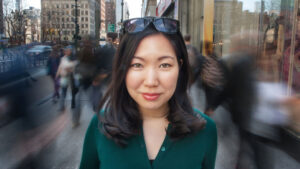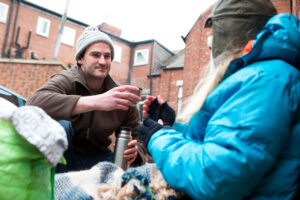Written by Scott Wilson

Advanced-standing MSW programs rely on you having already earned a Bachelor of Social Work (BSW). The structure of the advanced-standing MSW (sometimes called a one-year MSW) allows you to count the credits from your BSW toward the first year of your MSW. This means you can be out the door with your MSW in hand in as little as one year.
It doesn’t matter if you’re from upstate or uptown. From Long Island to Syracuse, exciting and important things happen here in New York, and we all want to be a part of it.
That’s not just true for Wall Street investment bankers; it’s true for the people who made Occupy Wall Street happen. It’s not just the high-flying international politics happening at the UN; it’s the kids camping on lawns holding ground in protest movements. Everyone knows that one minute more of injustice is one minute too long.
New York is the place where modern social work was born, and it’s still where international social justice movements get their start.
There’s no better place to learn the trade and ply the principles of equity and universal respect. And if you’ve already earned a BSW and are looking to make your next move, you know there’s no better way to start making an impact than by taking the next big step on the professional ladder with an advanced-standing Master of Social Work degree.
What Is an Advanced-Standing MSW?
Advanced-standing programs may require a little explanation for anyone just coming to the social work scene.
Advanced-standing programs offer a faster path to completing a master’s program on the basis of the BSW you already hold.
Let’s start by explaining what an advanced-standing MSW isn’t. These types of programs can work a bit differently from field to field. For example, in nursing, similar degrees may be called bridge programs, or accelerated degree programs.
But if you see an accelerated MSW program, that’s not the same as advanced-standing. In the world of social work graduate studies, accelerated programs just involve a more intensive course load that cuts a few months off a full two-year program.
Instead, advanced-standing MSW admissions rely on you having already earned a Bachelor of Social Work (BSW) degree from an accredited program. The structure of the Advanced-standing MSW essentially allows you to count the credits from your BSW toward what would otherwise be the first regular year of MSW studies.
Not all MSW programs are exactly two years in length, so not all advanced-standing admissions mean that you can complete your studies in one year—anywhere from 12 to 15 months is common, although part-time studies can extend it to 18 months overall.
Just to be perfectly clear: an advanced-standing MSW program ends with you getting the exact same Master of Social Work degree as any other accredited New York MSW program offers. The year of coursework in an advanced-standing MSW is nearly identical to the second year of a standard MSW program. The title on the degree is the same and your licensing opportunities are no different… just faster!
How To Know When an Advanced-standing MSW Is Right for You, and When it Isn’t
 Advanced-standing MSWs are amazingly popular in New York, and for good reason. There’s no faster track to LMSW and LCSW licensure, and the career you’re aiming for.
Advanced-standing MSWs are amazingly popular in New York, and for good reason. There’s no faster track to LMSW and LCSW licensure, and the career you’re aiming for.
But while there are some big advantages that come with advanced-standing MSW degrees, you need to be sure it’s right for you.
For starters, you need to have a BSW before you can even think about advanced-standing. That rules it out for anyone who has already earned a bachelor’s in another field.
It’s not uncommon for some people to use their bachelor’s studies to explore fields apart from social work for a broader base in human services or clinical expertise. It’s also not uncommon for folks to simply want to change direction and dedicate their careers to social work after earning a degree in another major. If you earned your bachelor’s in, say, psychology, or political science, or criminal justice, that’s going to rule out the advanced-standing MSW option.
It’s also worth noting that at some schools, some degree concentrations open to traditional MSW students may not be available through the advanced-standing option.
CSWE-Accreditation Is the Only Reason That Advanced-standing MSW Programs Work

The thing that makes the continuity between BSW and MSW studies work is the existence of a qualified specialty accreditation agency that evaluates social work degrees nationwide. Since you already hold a BSW, the Council on Social Work Education, or CSWE is a name that’s definitely familiar to you by now.
CSWE’s Board of Accreditation puts both bachelor’s and master’s degree programs in the field under the microscope to evaluate the resources, quality, and comprehensive nature of their social work education. They make sure all the marketing promises you read match the reality of the training you get.
It’s that consistent stamp of approval from a respected and independent third-party evaluator that allows colleges to accept your BSW studies as qualification toward the first year of an MSW. It means that your New York grad school doesn’t have to go back and exhaustively evaluate the BSW program you might have completed in Ohio to make sure it meets standards—they know it does because it has CSWE stamped right on the label.
Advanced-standing doesn’t do away with all admissions prerequisites. Colleges may also have additional coursework requirements over and above just holding a BSW.
Even though CSWE-accredited advanced-standing MSWs are designed to build on the BSW, there’s a time limit for acceptance at most schools. You must have earned your BSW within a specified number of years prior to applying for advanced-standing MSW admissions—typically five years or so. Otherwise, the concern is that your education won’t be current enough to prepare you fully for the one-year MSW.
1-Year MSW Programs Online: Fast-Track the Trip Through LMSW and LCSW Licensure in New York
Like every other kind of MSW program, you will find plenty of options to take an advanced-standing MSW almost entirely online with New York universities.
Of course, your required in-person practicum and internship commitments will have to be on-site, but most online programs at this point are well-versed in helping you line up local opportunities that will fulfill their experiential learning requirements.
With the remainder of your course load completely virtual, you can enjoy all the benefits of sticking close to home while getting a first-rate education from the school of your choice.
Those include:
- Saving money by avoiding having to relocate for only a year of graduate studies. With some of the finest schools in the state located in the most expensive parts of New York City, this can be a real reduction in your total out-of-pocket costs.
- Enjoying a greater selection of schools to choose from by opening up your options in areas further away. While we all know that the best social work schools are in New York, it’s possible that you’ll only find the concentration you need or the professors you click with best somewhere halfway across the country. Online studies give you all those options so you can find the best fit for your goals.
- Asynchronous coursework is the rule in online college degrees, so you aren’t confined to attending lectures or studying at particular times on particular days. Instead, you have the flexibility to keep your current job or take care of your family or other commitments while still getting ahead in class.
Hybrid options also exist in New York, which combine primarily on-line study with on-campus, intensive courses that put you on-campus a few days.
Your Advanced-Standing MSW Courses Will Be Fine-Tuned for Issues Unique to New York

In traditional MSW programs, year one is often referred to as the foundation year.
As an advanced-standing student, you have already laid the foundation with your bachelor’s in social work. When the time comes to step into graduate studies, you will dive immediately into advanced coursework.
Some of your professors may have done their homework in tenements and been in the social equity game long enough to have marched for equality. New York may look a little different now, but the causes are largely the same.
As we’ll discuss in the next section, the specifics of these classes will depend a lot on the kind of specialty you want to chase. But in general, they will hit on three areas of instruction:
- Advanced Clinical Practice - The heart of almost every MSW is the training you get in performing direct intervention with patients. You may cover individual and group therapy, or specialist approaches for kids, couples, or even organizations. Crisis intervention and case management skills cover essential tasks that every clinical social worker will encounter on the job.
The NYC Health Mobile Crisis Team (MCT) Proves that Speed Matters in All Aspects of Social Services
 For tourists, people wearing everything they own and screaming at buildings are local color. But for NYC social workers, it’s another sign of a mental health crisis that has crashed on the city like Hurricane Sandy flooding the subways.
For tourists, people wearing everything they own and screaming at buildings are local color. But for NYC social workers, it’s another sign of a mental health crisis that has crashed on the city like Hurricane Sandy flooding the subways.
But now, anyone can get help for individuals in crisis by dialing 988. A Mobile Crisis Team from NYC Health can be on the scene in no time.
Made up of behavioral health professionals including peer specialists, advocates, and clinical social workers, they can come to individuals experiencing mental health issues and immediately assess, support, and refer them for more services.
Social workers delivering this intensive mobile treatment lean heavily on the crisis intervention skills they learn in MSW programs. Your advanced-standing MSW comes with the tools to rapidly evaluate social and psychological issues, and a catalog of resources that can be used to address them.
It’s too soon to see what the long-term impacts of the MCTs will be on health and welfare in NYC. But it’s another example of the way that social workers are quick on the draw here when it comes to offering assistance.
- Social Work Research Skills - Although social work degrees are very much practice-oriented, they do still include the traditional aspects of master’s programs everywhere by encouraging and requiring individual research and discovery. You’ll learn how to analyze everything from the causes and treatment of societal problems to the systems that contribute to both. You’ll also develop the judgement and investigative skills to keep up with the latest developments in social work even after you graduate.
- Human Behavior and Society - The environment in which people exist defines their choices and perspectives. It’s necessary for social workers in every field of practice to have a strong grasp of how society impacts behavior and vice versa. These are the classes where your specialty area is explored in relation to social systems, culture, and human services in New York and the nation.
One of the best possible things about going with an advanced-standing MSW in New York are the electives you can choose from. You’ve only got one-year to play with, so you have fewer shots to take than you would with a traditional MSW. But in a city and state where legends of progressive social work are putting their hearts into curriculum plans, you can pick unique classes crafted by people forged in the fire:
- Explore the role of probation in criminal justice supervision from people who have fought the good fight on bail reform and pretrial detention in notorious places like Sing Sing and Rikers Island
- Study the boundaries of restorative justice with professors who have pioneered explorations of reparations and victim support systems.
- Investigate immigrant and refugee services side-by-side with faculty who were on the front line resisting illegal deportations during the 2017 Muslim Ban.
They Don’t Call It a Specialization Year for Nothing: How Your Advanced-Standing Coursework Will Define Your Career as a New York Social Worker

With the basics out of the way, advanced-standing students are free to dive into what many schools call the specialization year of MSW studies: the advanced coursework focused on specific types of social work practice.
With many different populations and challenges of social justice and equity, social work has a dizzying array of specializations to choose from. While it’s definitely possible to become a generalist and take on all types of problems as they come at you, most social workers end up developing specialized expertise in an area of focus they are most interested in.
Your MSW studies are where that starts.
The most common specialist curriculum options tend to revolve around the NASW (National Association of Social Workers) definitions for specialty practice areas:
- Administration/Supervision
- Aging
- Alcohol, Tobacco & Other Drugs
- Child Welfare
- Children, Adolescents & Young Adults
- Health
- Mental Health
- Private Practice
- School Social Work
- Social and Economic Justice & Peace
- Social Work & The Courts
But there are no rules. Every school of social work can mix and match or innovate in entirely new areas. Some unique options available from New York social work schools include:
- Health Across the Life Course
- Clinical Practice with Individuals, Families, and Groups
- Community Organizing Planning & Development
- Community, Policy, and Political Social Action
- Families, Youth, and Transition to Adulthood
- Integrated Health: Physical, Psychological, and Social Well Being
The specific classes you study in each of these will reflect the school’s unique approach to developing advanced social work competencies.
Advanced-Standing MSW Practicums Let You Slow Down and Focus on Real-World Ways to Help New York Communities

While about half of the 900 practice hours required by NYSED licensing standards will be completed before you even enroll in your advanced-standing MSW, you’ll probably get the biggest impact from the experiential learning you go through at this level.
Just as with your bachelor’s, practicum courses in an advanced-standing MSW will be relatively short placements that are used to help drive home theoretical concepts and classroom study with real-world situations you’ll encounter in New York every day.
While many BSW programs use practicum placements as a chance to introduce you to a variety of different types of social work, though, your MSW placements will likely be in your specialty field. They are more about honing your practice skills and offering an opportunity to correct any lingering questions you have about core skills.
One-Year MSW Degrees Are a Fast Path To Diverse Social Services Jobs and More in New York
New York is a big state with a lot of needs for social services. The New York metro area alone has a higher employment level for some types of social workers than most entire states. And this is a place where both governments and nonprofits back up the demand for services with funding for jobs.
The opportunities for anyone with an LMSW or LCSW credential are boundless.
- Direct clinical counseling is always in demand in a state where an estimated 900,000 residents annually need mental health treatment according to the state Office of Mental Health.
- Navigating the American healthcare system and pointing patients to resources for treatment and financial assistance are important as medical costs skyrocket and access collapses.
- Children and families lean on social services to deal with malnutrition, poverty, violence, and mistreatment every day in every borough and county in the state.
- Economic inequity is nowhere in the nation more clearly a problem than beneath the skyscrapers of Wall Street. Social workers help people apply for financial assistance, figure out housing issues, and assist in job searches.
That’s just a tiny sampling of the kinds of roles licensed social workers fill every day all over the state. There may be nowhere that is more entrepreneurial than New York when it comes to finding new ways for social workers to help at-risk populations, though. So if you see a need, you will have the education and opportunity to go do something about it.
Of course, plenty of people who start out in social work don’t stay there. The kinds of systemic issues that social workers are trained to engage with are usually solved at different layers of society. So lobbying, advocacy, and even elected office are in the cards for plenty of New York social workers who are interested in lasting solutions for social justice and equality.
It’s a place where you can change a city, change a state, change a country, or change the world. With an advanced-standing Master of Social Work, you can get out there and help bring about that change faster than ever.
